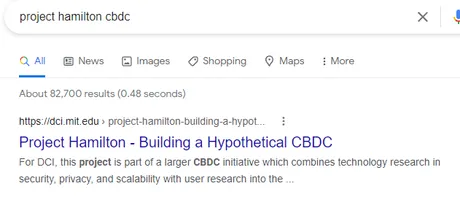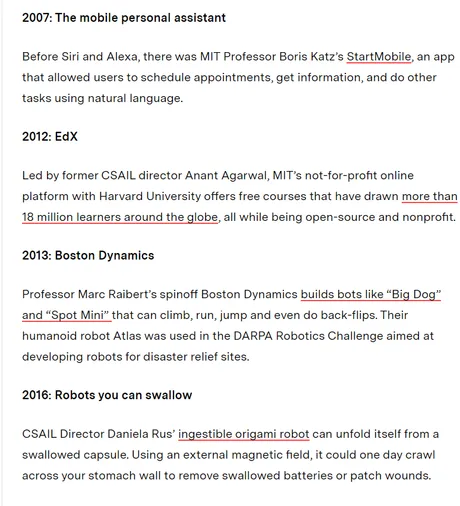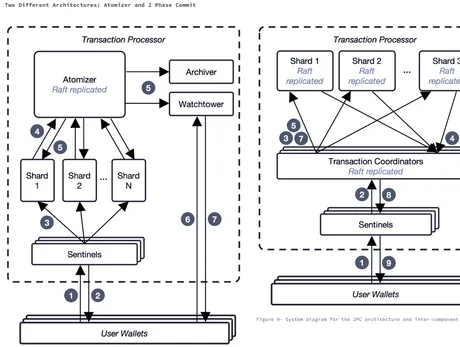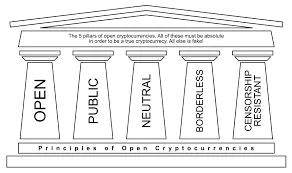There are a ton of science fiction movies from the 80's and whatnot that constantly portray completely useless inventions integrated as a part of everyday life. Sometimes it's hard to tell if the director is being serious or if it's just a political statement on toxic consumerism and everyone running around buying things they don't need. Maybe a bit of both.
The satire is real.
I couldn't find a video clip of what I was looking for, but I did find that Turbo Encabulator video, which is arguably even better. It's a nonsense technology that doesn't do anything that leverages technical words to trick people into thinking it does something useful. Remind you of another technology? How many DEFI projects have crashed to zero since 2020?
But the real "Turbo Encabulator" of crypto: is CBDC.
It has no value, everyone knows it has no value, and yet still so many people in this space think it's this looming threat that could doom us all to a lifetime of servitude in a dystopic technological future. In my last post about CBDC 18 days ago, @thefed posted the following video to show that CBDC is real and implementation is right around the corner.
Against my better judgement and time management I listened to this entire video. 90 minutes later I was glad I did. I learned a lot of new things about CBDC that I did not know before. It has a bit of a conspiracy theory angle to it, which is fitting considering the fact that something like this could never become a reality.
Two of the conspiracy theory things I remember from the video was the fact that the project itself is called Project Hamilton, which is weird because of the Hamilton musical that won all the awards on broadway and then touts central banking as Alexander Hamilton's great achievement. You have to admit... it's pretty weird that this woke version of history sprinkles the importance of the very institution that has pseudo-enslaved all of mankind.


Hm, yeah... okay... so that's weird.
The second conspiracy theory thing was how the devs describe the protocol itself. In object-oriented programs, we tend to name things in a way that makes sense as to what the object does. Project Hamilton uses language like watchtower and sentinel. This is the same kind of language that one would use to describe a prison to make sure that the inmates do not escape. Yeah, it's creepy, but is it real? It is not.
I love me a good conspiracy theory, but I also have a lot more knowledge of geo-politics and macro economics than most. There are many conspiracy theories out there that are simply not possible, because they assume that the world is unilaterally controlled by a Deep State that works in perfect harmony to enslave the world. That isn't real, and neither is the ability for CBDC to be forced on the population.
CBDC is only valuable to those that control it.
So how many people control it? Five? Twelve? Pick a number, it doesn't matter. It is that number vs every other person on the planet. There are over 3000 billionaires on the planet. Consider that for a moment. Why would 3000 billionaires allow a dozen people to control everything? They wouldn't. Retail banks will not allow it. Governments will not allow it. Citizens will not allow it.
As @taskmaster4450 points out time and time again, even central banks will not allow it. Both the FED in USA and Japan have come forward and admitted that the technology is worthless and a heinous conflict of interest. It's not going to happen, and yet people in crypto continue to hysterically proclaim that it's going to be a huge problem.
To be fair, it's good to keep an eye on these things.
I am not blind to what is going on here, I'm just being a realist. The current climate will not allow a CBDC to come into play. Talk to me again after USD crashes to zero or if we start a nuclear war, then we'll talk. Or be dead; one of those. And in that case I still win because we still didn't have to worry about CBDC, amirite? Silver lining!

The way CBDC works is completely untenable.
In the video, they show how CBDC gives the owner unilateral control of everything. They can mint tokens whenever they want, they can invalidate transfers when ever they want (thus deleting money from the ledger). The way the system works is so convoluted that no one can even access the database (except for the entity that controls the servers it runs on). Thus, there is no way to know if money in your account is even spendable or not because it could have been deleted and there would be no record of that until the money attempts to be spent.
Also, the way that it works requires that every single transaction be saved in a private ledger controlled by the owner of the funds. There was a great deal of speculation as to why this would be, and I believe these guys correctly speculate that the reason it appears to work in such a foolish way is that it all revolves around the ledger not being accessible by the public.

To give an example.
Say someone gives you $20, and another person gives you $30, and yet another person gives you $150. Now you have $200 in your account, right? WRONG!
Instead what you have is a full record of all three separate transactions. A frontend wallet might make it look like you have $200, but on a technical level? No. You have 3 transactions. One for $20, $30, and $150. All of the information has to be perfectly correct, or when you go to spend the money the hash will be invalid and the money will be lost.
So now you want to spend $40?
How will you do it?
Serious question!
- Will you spend $20 from the $20 transaction and $20 from the $30 transaction? This would allow you to delete the $20 transaction from your ledger since it's gone, however, the $30 transaction would still have $10 left, so you need to keep that around or you'll lose the $10.
- Will you spend $30 of the $30 and delete that from your ledger? Now you have to take $10 from somewhere else.
- Will you just take $40 from the $150? Now you don't have to pull from anywhere else but you have to keep all 3 transactions saved on your private ledger.

No problem right?
Because basic users won't actually have to make any of these decisions, we can just automate them with a bot, right? Ha, yes, well, there are problems with that as well. Because what happens if your bot gets hacked or if your hard drive simply gets corrupted? Boom, you just lost all your money. OOPS.
With crypto, you only have to remember or write down 12 words with a seed phrase to populate all your private keys. This implementation of CBDC requires someone to fully keep track of every transaction they have ever made. Does that sound like a sustainable solution? LOL it's border-line frittata.
So the guys in the video come to the obvious conclusion that most CBDC users are not going to keep their own records. Basically retail banks (or another third party like Coinbase or whatever) would be the ones to keep track of all this stuff. So not only is CBDC itself a counter-party risk because it is controlled by a tiny group of people, but also this third party that needs to keep the records so that money isn't lost is also a counter-party risk. It's like the Inception of derivative counter-party risk.
Again, the conclusions drawn from all this... are just flat out incorrect.
The guys in the video, and everyone else harping about CBDC, show how all these issues are a huge problem. It's not problem. It's just even more reason that CBDC could never be implemented in the real world. It's a completely nonsensical solution to a problem that doesn't exist. It has absolutely zero value, to anyone. In fact, it's less than worthless.
Nobody benefits.
Even in the magic fairytale land of rainbow unicorns where CBDC is implemented, what happens? Well, we already know that CBDC is less than worthless. Okay, so everyone is now forced to use CBDC, now what? The entire system implodes within a year because it has no value. Perhaps it would even crash the entire economy (again, because the only reason it can be implemented is if USD crashes to zero).
Even to the dozen people that control the CBDC, the CBDC has no value because it's a failed system that will crash into the mountain quite quickly. I guarantee it. This is not a good Ponzi that will generate income for a few decades before it implodes. It will implode instantly and generate no income. It's not even a good Ponzi; it's a bad one. In fact, it is even potentially a fatal scam, as the mob goes looking for who to blame for their family and friends starving to death in the street. If I was offered the opportunity to be in charge of a CBDC, I would pass, for fear of my own life. Not joking.
Googling Project Hamilton
Because we should at least do a bare-minimum follow-up, should we not?

BUILDING A HYPOTHETICAL CBDC WITH A FOCUS ON SECURITY AND PRIVACY.
It's a project out of MIT
So automatically you have to be a conspiracy theorist and be like, "Well, they are obviously lying and it's not hypothetical at all! This will become real in the near future!" Yes, either that or it's totally hypothetical and will never go anywhere because it's completely fucking worthless. Or that. Name a single useful thing that came out of MIT. I guess we'll have to check, eh?
https://news.mit.edu/2019/25-ways-mit-has-transformed-computing-0225

Wow, what an embarrassingly short list that all feeds into the military industrial complex and the medical industrial complex. That's fun.
Although EdX looks interesting, but I've never heard of it, have you?
Back to CBDC.
https://dci.mit.edu/project-hamilton-building-a-hypothetical-cbdc
A CBDC is very different from existing electronic payment systems, because it is ultimately a liability on the central bank. This means the holder of CBDC does not have counterparty risk the way one does when one takes payments electronically through existing products and channels.
Okay that's just a hilarious statement to make.
So MIT expects that casual users are going to secure, not only their own keys, but also their own ledger? That is just... comical. Most crypto users ALREADY use a custodian. The counter-party risk is the custodian that users are all but guaranteed to use on a statistical level. Coinbase would be the counterparty risk of a CBDC implementation like this one.
Again, this is two separate layers of risk stacked on top of each other. Such a terrible idea, I just don't have the words. It's almost enraging that so many people think that this worthless idea is actually a threat to them. Then again I suppose it's wise to remain skeptical and open minded in a climate such as this.
The possibility of central-bank-issued digital currency represents a unique opportunity to address challenges in our existing payments system and design an economy that is more resilient, participatory, and open.
that is more resilient, participatory, and open.
LOL... WHAT!??!
Hahaha, these fucking people. Yes, that makes perfect sense. You create a completely closed system that users can't even check their balances on, and this is an 'open' network. The mental gymnastics they are doing over there at MIT is apparently a thing of legend. I had no idea.
https://dci.mit.edu/opencbdc
OpenCBDC is an open source project to engage in collaborative technical research to understand the space of designs for potential central bank digital currencies (CBDC). The first phase of Project Hamilton with the Federal Reserve Bank of Boston led to the release of OpenCBDC-tx, a research codebase under a larger open source project called OpenCBDC.
Ah, well, that's kinda cool.
It's all open source. So even though the system is completely closed and controlled by a centralized entity, the code itself is still available to be looked at. This is exactly how the guys in the video learned so much about how it worked in the first place.
Again, I have to mention the fact that a CBDC has nothing to do with the codebase and everything to do with who runs the nodes. If I cloned this code and booted up my own currency, would it be a CBDC? Nope, because I'm not an institution that has the authority to do such a thing.
This is a significant part of the entire issue. It's not about the code so much as the entity in charge. If we look at DEFI projects on Ethereum they are all just as centralized and ridiculous as a CBDC. These are just tests. Tests that will ultimately fail in the long run if they don't properly evolve into something useful.

The goal of this global open source codebase is to help central bankers, policymakers, academics, and others make decisions on how this technology might be developed while promoting neutral, collaborative global research.
"Neutral..." lol
I mean... guys... come on. These people are absolutely delusional.
Why would we take these people seriously?
They are so far up their own asses it's legit unbelievable.
They've built a system that puts the burden of proof onto the users. They've built system that is so vague and ridiculous we can't even ping a node to find our own balance. If we don't know our own balance and maintain our own ledger, then we don't have any money. Worthless. Absolutely worthless. How could anyone be threatened by this?

Absolute garbage.
I'm suddenly reminded of an Andreas Antonopoulos quote about Bitcoin and CBDC. Andreas uses five pillars to define crypto:

- Open
- Public
- Neutral
- Borderless
- Censorship resistant.
Blockchain is great, but could we perhaps remove everything about it that makes it valuable and replace it with something we unilaterally control?
A CBDC is none of these things.
And thus is less than worthless and doomed to never actually be used in any real mainstream capacity. Which is fine. This is just all part of the process. The legacy system is in the bargaining phase when it comes to crypto. They think that they can create some kind of secret sauce to co-opt the technology. They can not. The entire value proposition is that they are not in control.

Conclusion
After learning more about CBDC and watching videos that are presented as evidence for why they are a threat, I've come to the conclusion, using the exact same information, that CBDC is even more worthless than ever. It's existence is a novelty, nothing more. Enterprise blockchain failed. We know why it failed. CBDC will fail for the exact same reason.
The difference of authority between corporations and central banks is not a reason to fret over trifles like this. CBDC is a huge nothing-burger that will never gain significant traction on any level. Every single aspect of the way it works is complete trash and barely even worth looking at. However, I'm glad I did, if only to debunk the hysterics in play.
Posted Using LeoFinance Beta
Return from Project Hamilton: Turbo Encabulator to edicted's Web3 Blog
